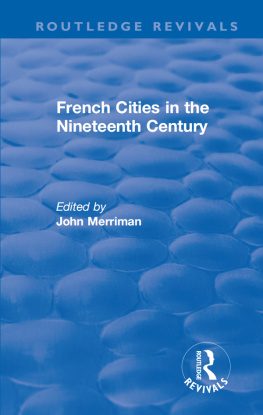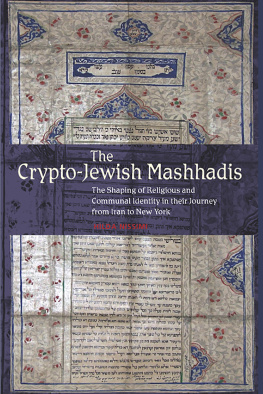Contents
Acknowledgments
Introduction
P ART O NE Enlightenment, Revolution, and Emancipation
1. The Road to Emancipation
2. The Emergence of the Jewish Question
3. French Maskilim and the Paris Sanhedrin
P ART T WO The Beginnings of Modernization
4. The Jewish Community: Continuity and Change
5. The Flight from Traditional Identity
P ART T HREE Tradition and Transformation
6. Le Mouvement Rgnrateur
7. Schools and Schoolmen
8. The Ideology of Educational Reform
9. The Modernization of Rabbinic Training
10. The Struggle over Religious Reform
P ART F OUR Jewish Identity in the Second Republic and Second Empire
11. Unity and Solidarity
12. Conclusion
Notes
Glossary
Selected Bibliography
Index
Acknowledgments
IT IS A PLEASURE for me to express my appreciation to the many individuals who have assisted me in this scholarly endeavor. First, I wish to thank my teachers in the Department of Near Eastern and Judaic Studies at Brandeis University. I am grateful to Professor Ben Halpern for introducing me to the rigors of historical method and to Professor Benjamin Ravid for his patient guidance of my doctoral dissertation. Professor Marvin Fox deserves special mention, not only for helping me learn to appreciate the centrality of classical texts in Jewish history, but also for his unfailing encouragement and sage counsel.
The Memorial Foundation for Jewish Culture and the National Foundation for Jewish Culture provided generous assistance for my dissertation research. I also wish to acknowledge the Graduate Research Council of the University of Massachusetts at Amherst for awarding me a Faculty Research Grant in 1983 to study resistance to modernization, and Professor Murray M. Schwartz, Dean of the Faculty of Humanities and Fine Arts for his support of several research related activities.
I wish to thank the staffs of the numerous archives and libraries which I consulted: Brandeis University Goldfarb Library, and the Rapaporte Treasure Hall which houses the Franco-Judaica Archival Collection; Houghton Library, Harvard University; the Archives of the Jewish Theological Seminary of America, New York; the Archives of the Leo Baeck Institute, New York; the Klau Library and French Jewish Archival Collection, the Hebrew Union College, Cincinnati; the Archives Nationales, Paris; the Bibliothque Nationale, Paris; the Archives of the Central Consistory and the Paris Consistory; the Library of the Alliance Isralite Universelle, Paris; Musee Lorrain, Nancy; the Institute for Microfilmed Hebrew Manuscripts, Jerusalem; the Central Archives for the History of the Jewish People, Jerusalem; Asher Library, Spertus College of Judaica, Chicago; and the University of Massachusetts Library. I also want to express my appreciation to Dr. Bernhard Blumenkranz, director of the Commission Franaise des Archives Juives, for sharing with me sources of the Nouvelle Gallia Judaica.
Over the course of the research and writing of this book I have benefited greatly from the generosity of many colleagues and friends. Professors David Ellenson and Aron Rodrigue read the manuscript and offered valuable comments. Professors Shmuel Bolozky, Monford Harris, Jonathan Helfand, and Charles Rearick were kind enough to answer queries and to discuss various difficulties. I am grateful to Professor Moshe Berger for his willingness to discuss some of the broader conceptual issues raised in this study. Professor Charles Raffel has been a loyal friend and a tireless sounding board for many of the ideas in this book and has helped me to clarify my thinking on numerous issues.
The arduous task of producing this volume has been facilitated by the assistance of Peri Tarr and Ellen Seger who typed the manuscript. Betsey Chadwick offered skillful editorial assistance and insightful criticism, all the while prodding me to develop and expand my thinking. I am also grateful to Robert Mandel, director of the Wayne State University Press and to my editors. Laurel Brandt and Anne Adamus.
Finally, I want to express my gratitude to Professor Isadore Twersky, whose own research has illuminated a different era of French and general Jewish intellectual history. He has had a profound and sustaining influence not only on my intellectual growth, but also on my personal vision.
Needless to say, I alone am responsible for the errors and shortcomings in this book.
This book is dedicated to my mother and to the memory of my father. My parents instilled in me a love of learning, took a keen interest in my work, and were selfless in their devotion to me and my brothers. Together they created a home filled with warmth and love, a home where ideas informed our values. Regrettably, my father (d. 5 Tammuz 5742) did not live to see the completion of this work. Nevertheless, the legacy of honesty and kindness which he left behind remains an enriching inspiration for me and our family.
To my dear wife Sharon go the thanks of a frequently preoccupied husband. I am grateful for her many sacrifices that have made it possible for me to complete this book.
Introduction
SINCE THE LATE eighteenth century, the Jews of Europe and their descendants have been preoccupied with an ongoing struggle to preserve their identity in a new and rapidly changing world. In this they have not, of course, been unique; like other sectors of European society, Jewish communities were transformed by nineteenth-century economic and social developments. The forces of urbanization, industrialization, and secularization upset the relative stability of a life rooted in tradition. Communal structures were disassembled, the family ceased to function as the basic framework for socialization, and religious authority was undermined by new philosophical, societal, and ideological concerns. Out of these upheavals, the question of identity emerged as a universal problem, marked by an urgent need to justify and define ones existence. Although the modern Jewish experience must be understood in these terms, those factors that distinguished it from the general European pattern must not be ignored. For the Jewsdue to the special circumstances of their emancipation from centuries of legal disabilitiesthe process of modernization has been extraordinarily challenging and unusually intensive, frequently devastating in its consequences. Particularly in western and central Europe, the challenges of modernity have been met with a readiness to conform to the cultural norms of general society, frequently producing an attenuated loyalty to Jewish community and tradition and leading in some instances to the abandonment of Jewish identity. The legacy of emancipation has been a seemingly irreversible process of alienation and estrangement.















